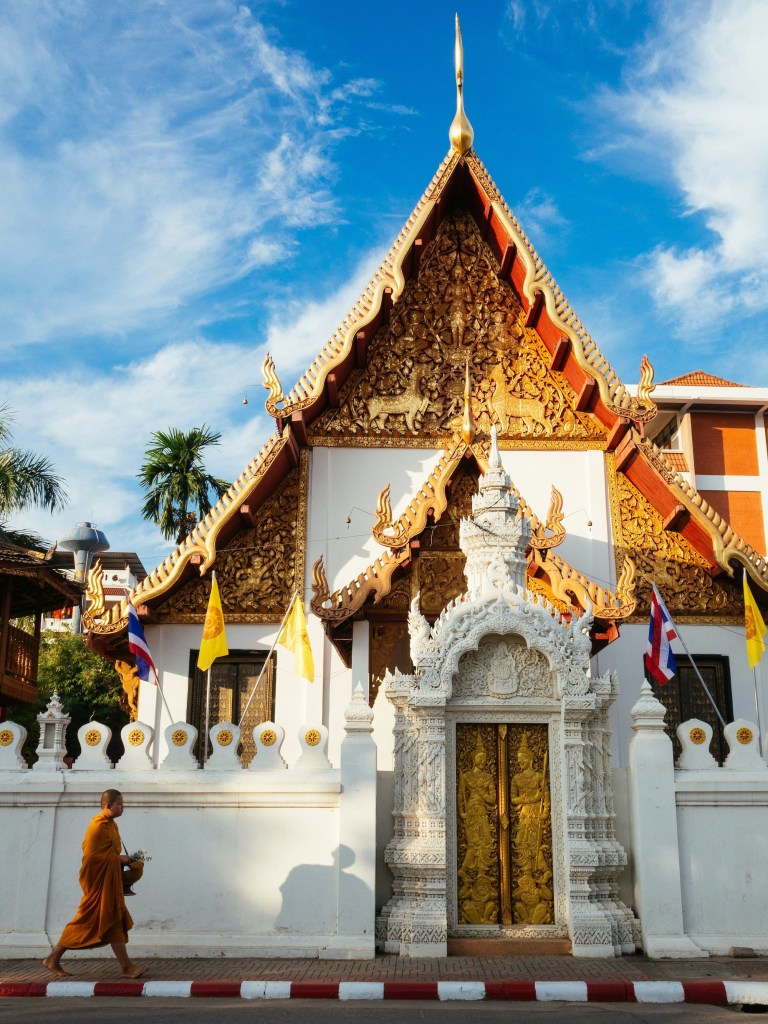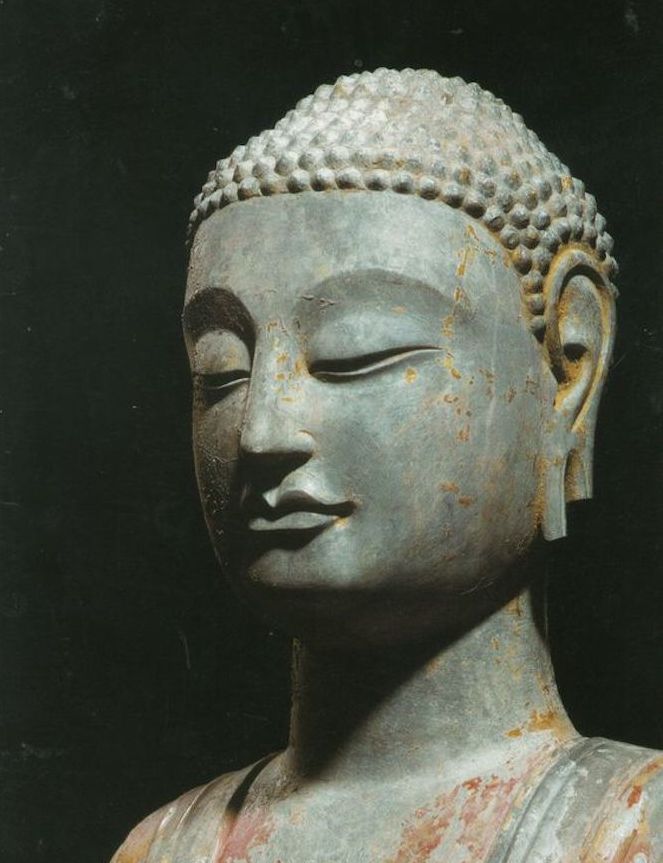
Ajahn Sumedho
In terms of this moment, right now, this is consciousness. We are reading words on a page – pure consciousness before you start thinking. Just make a note of this: consciousness is like this. I am reading, I am with this present moment, being present, being here now. I’m taking the word consciousness and making a mental note: ‘consciousness is like this.’ It’s where thought, feeling and emotion arise. When we are unconscious, we don’t feel, we don’t think. Consciousness, then, is like the field that allows thought, memory, emotion and feeling to appear and disappear.
Consciousness is not personal. For something to become personal you have to make a claim to it: ‘I am a conscious person.’ But there’s just awareness, this entrance into noting the present, and at this moment consciousness is like this. Then one can notice the sound of silence, the sense of sustaining, being able to rest in a natural state of consciousness that is non-personal and non-attached. Noting this is like informing or educating oneself to the way it is. When we are born, consciousness within this separate form starts operating. A new-born baby is conscious, yet it doesn’t have a concept of itself being male or female or anything like that. Those are conditions we acquire after birth.
This is a conscious realm. We might think of a universal consciousness, and consciousness as it is used in the five khandhas: rūpa (form), vedanā (feeling), saññā (perception), saṅkhārā (mental formations), and viññāṇa (sense-consciousness). But there is also this consciousness which is unattached, unlimited, Deathless. In two places in the Tipiṭaka, there is reference to viññāṇaṁ anidassanaṁ anantaṁ sabbato pabhaṁ – a mouthful of words that point to this state of natural consciousness, this reality. For myself, I find it very useful to clearly note: ‘Consciousness is like this.’ If I start thinking about it, then I want to define it: ‘Is there an immortal consciousness?’ Or we want to make it into a metaphysical doctrine or just deny it, saying, ‘Consciousness is anicca, dukkha, anattā.’ We want to pin it down or define it either as impermanent, unsatisfactory and not-self, or raise it up as something we hold to as a metaphysical position. But we are not interested in proclaiming metaphysical doctrines, or in limiting ourselves to an interpretation that we may have acquired through this tradition. Instead, we are trying to explore consciousness in terms of experience. This is Ajahn Chah’s pen paccattaṁ – that is, ‘something that you realize for yourself.’ What I am saying now is an exploration. I’m not trying to convince you or convert you to ‘my viewpoint.’
Consciousness is like this. Right now, there is definitely consciousness. There is alertness and awareness. Then conditions arise and cease. If you sustain and rest in consciousness, unattached, not trying to do anything, find anything or become anything, but just relax and trust, then things arise. Suddenly you may be aware of a physical feeling, a memory or an emotion. That memory or sensation becomes conscious, then it ceases. Consciousness is like a vehicle; it’s the way things are.
Is consciousness something to do with the brain? We tend to think of it as some kind of mental state that depends on the brain. The attitude of Western scientists is that consciousness is in the brain. But the more you explore it with sati-sampajañña, you see that the brain, the nervous system, the whole psychophysical formation arises in this consciousness; it is imbued with this consciousness. That is why we can be aware of the body and reflect on the four postures – sitting, standing, walking and lying down. Being aware of sitting as it is being experienced now, you are not limited to something that is in the brain, but the body is in consciousness. You are aware of the whole body in the experience of sitting.
This consciousness is not personal. It’s not consciousness in my head and then consciousness in your head. Each of us has our own conscious experience going on. But is this consciousness the thing that unites us? Is it our ‘oneness’? I’m just questioning; there are different ways of looking at it. When we let go of the differences – ‘I am Ajahn Sumedho and you are this person’ – when we let go of these identities and attachments, then consciousness is still functioning. It’s pure. It has no quality of being personal, and no condition of being male or female. You can’t put a quality into it. It’s like this.
When we begin to recognize that which binds us together, that our common ground is consciousness, then we see this is universal. When we spread mettā to a billion Chinese over in China, maybe it’s not just sentimentality and nice thoughts, maybe there is power there. I don’t know myself; I am questioning. I am not going to limit myself to a particular viewpoint that has been conditioned by my cultural background, because most of that is pretty flawed anyway. I do not find my cultural conditioning very dependable.

Sometimes Theravada Buddhism can come across as annihilationism. You get into this ‘no soul, no God, no self’ fixation, this attachment to a view. Or are the Buddha’s teachings there to be investigated and explored? We are not trying to confirm somebody’s view about the Pali Canon, but rather we use the Pali Canon to explore our own experience. It’s a different way of looking at it. If we investigate this a lot, we begin to see the difference between pure consciousness and when self arises. It’s not hazy or fuzzy, ‘Is there Self now?’ It’s a clear knowing.
So, then the self arises. I start thinking about myself, my feelings, my memories, my past, my fears and desires, and the whole world arises around ‘Ajahn Sumedho.’ It takes off into orbit – my views, my feelings and my opinions. I can get caught into that world, that view of ‘me’ that arises in consciousness. But if I know that, then my refuge is no longer in being a person, I’m not taking refuge in being a personality or my views and opinions. Then I can let go; the world of Ajahn Sumedho ends. When the world ends, what remains is the anidassana viññāṇa – this primal, non-discriminative consciousness. It’s still operating. It doesn’t mean Ajahn Sumedho dies and the world ends, or that I’m unconscious.
Talking about the end of the world, I remember somebody getting very frightened by this, saying, ‘Buddhists are just practising meditation to see the end of the world. They really want to destroy the world. They hate the world and they want to see it end’ – this kind of panic reaction. To us the world is seen in physical terms – this planet, the world of continents and oceans, North Pole and South Pole. But in Buddha-Dhamma, the ‘world’ is the world we create in consciousness. That’s why we can be living in different worlds. The world of Ajahn Sumedho is not going to be the same as the world you create, but that world arises and ceases. That which is aware of the world arising and ceasing transcends the world. It’s lokuttara, transcendent, rather than lokiya, worldly.
When we are born into physical birth, we have consciousness within a separate form. This point of consciousness starts operating, and then we acquire the sense of ourselves through our mothers and fathers and cultural background. We acquire different values or sense of ourself as a person that’s based on avijjā, not on Dhamma – based on views, opinions and preferences that cultures have. That’s why there can be endless problems around different cultural attitudes. As with living in a multicultural community like this, it’s easy to misunderstand each other because we’re conditioned in different ways of looking at ourselves and the world around us. But remember that cultural conditioning comes out of avijjā, ignorance of Dhamma. So, what we are doing now is informing consciousness with paññā – which is a universal wisdom rather than a cultural philosophy.

[Continued next week 14 March 2024]
Excerpts from “Intuitive Awareness,” by Ajahn Sumedho, the Chapter titled Consciousness. This is a free Dhamma publication available as PDF EPUB MOBI. Link below:
https://archive.org/details/intuitiveaware00sumearch

You must be logged in to post a comment.